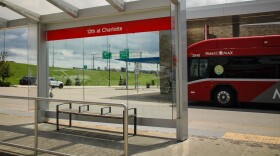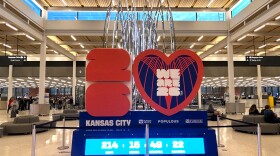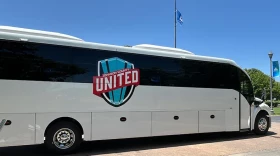-
The Kansas City Area Transportation Authority will charge for bus rides starting in June. The $2 fare can be paid through an app, credit or debit card, or reloadable fare cards.
-
Around 80% of bus stops across the metro do not have somewhere for riders to sit. Even fewer have a shelter. An interactive map from KCUR shows where to find amenities at each bus stop in the metro, and what the area transit agencies are doing to add more.
-
The city is giving the Kansas City Area Transportation Authority an additional $13 million as part of a contract agreed on in August. But the KCATA still plans to cut two bus lines and limit hours on more than a dozen others.
-
Kansas City’s transit agency is getting rid of its CEO after years of budget problems and route cutsFrank White III has led the Kansas City Area Transportation Authority since 2022. The KCATA board decided to not renew his contract amid high tensions between the agency and Kansas City, and a looming fiscal cliff that has threatened service cuts multiple times this year.
-
The new routes will run for 32 days during the 2026 World Cup. For a fee, the buses will take fans and ticket holders between the Kansas City airport, Arrowhead Stadium, the FIFA Fan Festival and "regional hubs."
-
Johnson County commissioners unanimously approved the county's first ever strategic plan for bus, micro transit and paratransit services. It recommends focusing on increasing frequency of buses along a few key routes, reinstating bus fares and rebranding as "Ride JoCo."
-
The free bus service connecting the Overland Park Convention Center and Lenexa City Center to the airport will run from March to November next year. The aim is to connect World Cup travelers to local hotels and events, but the service is open to everyone.
-
About 75% of Kansas City bus stops don't have anywhere to sit while you wait, and the Kansas City Area Transportation Authority keeps removing benches despite complaints from riders. Sunrise Movement KC is taking things into their own hands, but their makeshift seats may be removed as quickly as they're assembled.
-
Kansas City ended free bus fares and saw a grocery store shutter. Both issues showed up in the New York City mayoral race, where conservative outlets used the city's policies to attack leading candidate Zohran Mamdani.
-
"Free buses" is one of the big ideas that helped Zohran Mamdani win the Democratic mayoral primary in New York City. But in Kansas City, the bus system is going the opposite direction after years of free fares — mostly because of a lack of transit funding.
-
RideKC is discontinuing the popular Main Max bus line to avoid duplicating service with the KC Streetcar’s Main Street extension. A new route will take riders further south to 75th Street, while other bus lines undergo changes to connect riders to streetcar stops.
-
A new poll from the Kansas City Regional Transit Alliance found that voters in four counties across the metro would support a regional sales tax dedicated to bus service, even as soon as next year.
Play Live Radio
Next Up:
0:00
0:00
Available On Air Stations











